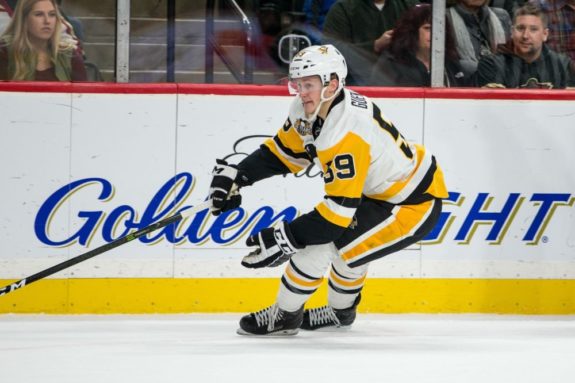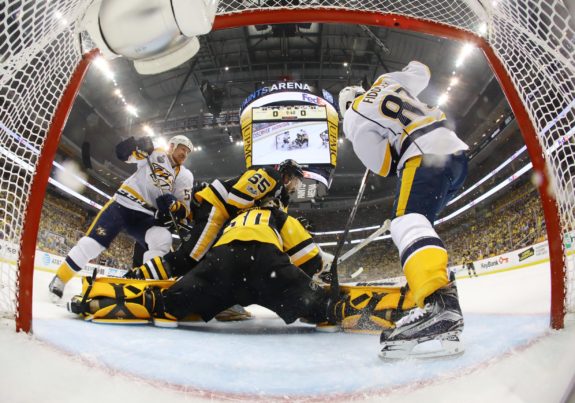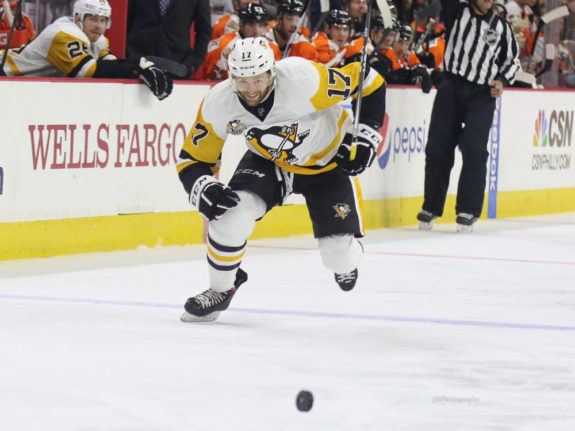In the words of defenseman Justin Schultz, Game 1 of the Stanley Cup Final was “weird”. The Pittsburgh Penguins ended the game with abysmal statistics, including a barrel bottom-scraping 12 shots. They broke several records, becoming the first team in franchise history not to record a single shot in a period of a Final game and creating a new low for the fewest number of shots ever scored in a SCF victory. Somehow, they still won the game 5-3.
“But we outshot and outplayed them!” the Nashville Predators cry. The eliminated Washington Capitals look on in silent commiseration.
Winning Score, Losing Stats
By most stats, the Penguins were not the better team in this competition. The Predators had over double their shots on goal and were twice as successful on the power play. They dictated play for huge swaths of the game, including the opening few minutes, the entire second period, and most of the third. They dominated possession, forcing turnover after turnover for the Penguins, who barely got any time in the offensive zone in the entire second period.

The Penguins had a strong five minutes in the first period that gave them a 3-0 lead. They spent the rest of the game squandering it. They finished victorious because of two main reasons. One was luck, which sent a go-ahead Predators’ goal pinging off the bar with four minutes left. The other was snakebitten Jake Guentzel, who shook off his goal-scoring drought with three minutes left in the third. The Penguins’ first shot in 37 minutes ended up in the back of the net, which pretty much sums up why this team fun to be a fan of and incredibly frustrating to root against.
But let’s face it. If that Predator’s shot hadn’t hit the crossbar and had instead gone in, Guentzel’s goal would have been a game-tier, not a game-winner. Nick Bonino’s empty net insurance goal would never have come. And the game likely would have gone into an overtime that the Penguins looked like they had no business winning. Despite the fact that they ended with a two-goal lead, the Penguins’ narrowly escaped this one. They know it. And they need to act like it.

Penguins’ History After Losses
It’s key that head coach Mike Sullivan treats this as a loss. The Penguins have only lost two games in this playoff run coming out of a defeat. Sullivan has worked hard to instill this sense of resilience in the team; they went an incredible 90-game stretch last year without losing back-to-back games. This ability to bounce back has become core to the Penguins’ identity.
Picture the Penguins’ worst two losses in these playoffs. The first is Game 6 of the series against the Capitals. The Penguins had the chance to clinch the series at home; instead, they found themselves down 5-0 with five minutes left on the clock, sending the series down to a do-or-die Game 7 on enemy ice. The second is Game 3 of the series against the Ottawa Senators, in which the Penguins once again saw themselves down 5-0. Both of these games saw abysmal play from the Penguins, in which commentators roasted them as slow and sloppy. And after each of these ugly losses, the Penguins managed to bounce back and win the next one.

This ugly win had all of the same qualities; abysmal play, slow skating, and sloppy passes. That could actually end up being a very good thing for the Penguins. If they treat this like they would a loss and focus on things like bouncing back, taking it one game at a time, fixing glaring flaws and getting more pucks on the net — all that good stuff — then they have a very good chance of taking Game 2 by storm.
The Penguins got away with this one. If they can learn from it and bounce back for Game 2, as they are known to do, they put themselves in an excellent position going back to Nashville. If there’s one thing we’ve learned from the Penguins, it’s that after a game like this, you can expect to see a much stronger team out on the ice on Wednesday.